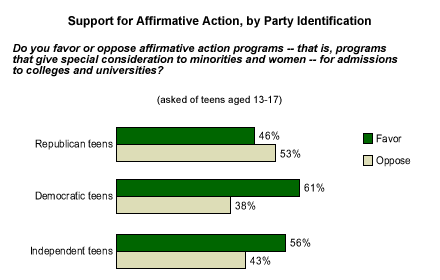The U.S. Supreme Court will hear arguments today in two cases that question whether the University of Michigan's use of racial preferences in its admissions process violates U.S. constitutional and civil law. If the court finds that the Equal Protection Clause of the 14th Amendment forbids preferential treatment of one racial or ethnic group over another, the implications will be far-reaching. The ruling could affect not only college admissions policies, but also the future of affirmative action.
As the generation poised to enter college in the next few years, today's teens will be the first potentially affected after the Supreme Court's decision. The 2003 Gallup Youth Survey* asked teens (aged 13 to 17) whether they favor or oppose affirmative action programs that make special admissions considerations for minorities and women at colleges and universities. The results indicate that while a majority of teens favor such programs, those who stand to benefit from them -- namely, girls and minorities -- are more likely to do so.
Teen Admissions
A majority of teens (55%) say they favor affirmative action programs that give special consideration to minorities and women in admission to colleges and universities, but a substantial percentage (44%) opposes them. These percentages are similar to what Gallup finds among American adults.
Female teens are more likely than their male counterparts to favor such programs. Sixty percent of teen girls favor these programs, compared with 50% of teen boys. Teen girls tend to attach more importance to a college education than boys do, and more girls than boys plan to go to college full time after high school** (see "Degrees of Change: Female Grads Outnumber Males" in Related Items). This tendency may help explain why girls are somewhat more likely than boys to favor these programs. If teen girls perceive that affirmative action programs make admissions to colleges and universities easier for them, they may view the programs as an aid to achieving their education goals.
The Paths Diverge
The most apparent differences in teens' opinions are observed in racial and ethnic splits, as is the case in the adult population. Nonwhite teens are significantly more likely than white teens to favor affirmative action programs in college admissions, 67% versus 45%, respectively. Among adults who were asked a similar question in 2001***, a similarly large gap between whites and blacks was found.
White teens are one of two of the demographic groups analyzed in which a majority does not favor affirmative action programs. The other appears when examining teens' political inclinations. Although teens included in the Gallup survey are not old enough to vote, they are asked which political party they will likely vote for when they are old enough to do so. Less than half (46%) of Republican teens favor affirmative action programs, as do a majority (61%) of Democratic teens. The political differences can be attributed in part to the fact that a majority of black teens (54%) indicate that they will be Democrats.

Academic Standing
Teens who say they are near the top of their classes or above average academically are slightly more likely than those who say they are average or below average to oppose affirmative action programs. Forty-eight percent of "near top" and "above average" teens oppose these programs, compared with 39% of average and below-average teens. The differences may be related to hesitancy among nonwhite teens to describe their class standings as near the top of the class or above average: 54% of white teens describe their class standings as "near top" or "above average," compared with 45% of nonwhite teens who say the same.
*The Gallup Youth Survey is conducted via an Internet methodology provided by Knowledge Networks, using an online research panel that is designed to be representative of the entire U.S. population. The current questionnaire was completed by 1,200 respondents, aged 13 to 17, between Jan. 23-Feb. 10, 2003. For results based on the total sample, one can say with 95% confidence that the maximum margin of sampling error is ±3%. For a complete description of the sampling and weighting procedures used to conduct the survey, click here.
**Findings are based on telephone surveys of approximately 501 American teen-agers, aged 13 to 17, conducted December 2000 through February 2001. For results based on this total sample, one can say with 95% confidence that the maximum error attributable to sampling and other random effects is ±5%.
***Results are based on telephone interviews with 1,017 national adults, aged 18 and older, conducted Aug. 3-5, 2001. For results based on the total sample of national adults, one can say with 95% confidence that the margin of sampling error is ±3%.